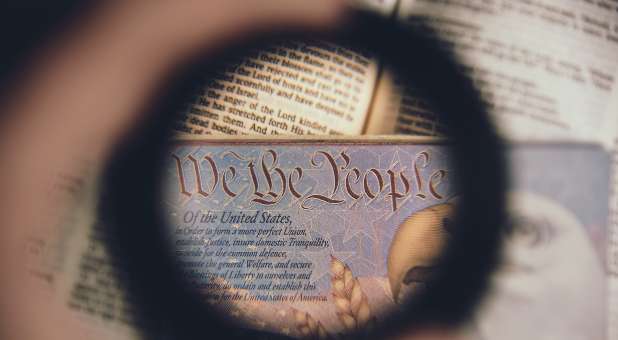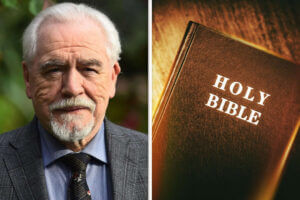Those of the modern Left who are disparaging America’s founders and her founding documents have departed from the vision and thinking of the great abolitionists and civil rights leaders of the past, including Frederick Douglass and Dr. Martin Luther King Jr.
Both Douglass and King showed great respect for America’s founders and America’s founding documents. In a July 4 speech delivered in 1852, Douglass said,
Fellow Citizens, I am not wanting in respect for the fathers of this republic. The signers of the Declaration of Independence were brave men. They were great men too—great enough to give fame to a great age. It does not often happen to a nation to raise, at one time, such a number of truly great men.
The difference between Douglass and King versus modern anti-American pundits is that they understood history and, therefore, the significance of what happened in 1776 and 1787. They realized that, although imperfect, the founders struck a bold and clear blow for liberty by formulating anti-slavery founding documents at a time when slavery was accepted and practiced throughout the world.
Indeed, America’s founders were turned against slavery by a great spiritual awakening that transformed 18th-century Colonial America and ignited an anti-slavery movement that turned multitudes against the institution. These facts led the noted Black scholar, Dr. Thomas Sowell, to write,
Among those who turned against slavery in the 18th century were George Washington, Thomas Jefferson, Patrick Henry and other American leaders. You could research all of 18th-century Africa or Asia or the Middle East without finding any comparable rejection of slavery there (Hyatt, 1726: The Year that Defined America, 90).
When the time came for separation from Great Britain, the founders formulated founding documents that were designed to also oppose slavery. As a result, abolitionists and civil rights leaders from Douglass to Abraham Lincoln to King have used these documents to combat slavery and racial inequality.
King, for example, in his “I Have a Dream Speech,” exhorted America not to dispense with her founding documents but instead to live up to them. Speaking from the steps of the Lincoln Memorial, he declared,
When the architects of our Republic wrote the magnificent words of the Constitution and the Declaration of Independence, they were signing a promissory note to which every American was to fall heir. This note was a promise that all men, yes, black men as well as white men, would be guaranteed the “unalienable Rights” of “Life, Liberty and the pursuit of Happiness” (Hyatt, Abolitionist Founding Fathers, 54).
Then quoting from the Declaration of Independence, he proclaimed, “I have a dream that one day this nation will rise up and live out the true meaning of its creed: “We hold these truths to be self-evident, that all men are created equal.”
Both Douglass and King had studied the U.S. Constitution and understood that there are no classifications based on race, ethnicity or skin color. The words “slaves” and “slavery” are not mentioned. Instead, it speaks of “citizens,” “persons” and “other persons.” The language was purposeful. for James Madison said, “The Convention thought it wrong to admit in the Constitution the idea that there could be property in men” (1726: The Year that Defined America, 122-23).
In the 1852 speech noted above, Douglass took the nation and the church to task for allowing slavery to continue, but he praised the Constitution as “a glorious liberty document” and extolled the Founding Fathers for their courage and their wisdom. On another occasion, he said of the founding documents, “Anyone of these provisions in the hands of abolition statesmen, and backed by a right moral sentiment, would put an end to slavery in America” (Abolitionist Founding Fathers, 54-55).
Yes, in the founding documents, the founders gave abolitionists the legal instruments with which to combat slavery. A 1784 gathering of Methodist leaders in Baltimore understood this, and when they issued a statement denouncing slavery, they based it on both the Bible and the Declaration of Independence. They declared slavery to be “contrary to the golden rule of God as well as every principle of the [American] Revolution” (1726: The Year that Defined America, 97).
The revivalist preacher Samuel Hopkins (1721–1803) used the words of the Declaration in a pamphlet he wrote against slavery. Confronting those who argued that slavery was God’s way of bringing Africans from their pagan land to hear the gospel, he exclaimed, ” What sort of ‘gospel’ message is being conveyed when people are enslaved because of the color of their skin? The Declaration of Independence says all men are created equal with certain unalienable rights. Oh, the shocking, the intolerable inconsistencies!” (1726: The Year that Defined America, 90).
Lincoln also understood the anti-slavery character of the nation’s founding documents. In 1858, Lincoln, who had become the new Republican party’s first candidate for president, declared that the anti-slavery platform of the new party was built on the vision of the nation’s founders. He said:
In the way our Fathers originally left the slavery question, the institution was in the course of ultimate extinction, and the public mind rested in the belief that it was in the course of ultimate extinction. All I have asked or desired is that it should be placed back again upon the bases that the Fathers of our government originally placed it upon (Abolitionist Founding Fathers, 59-60).
The modern claims that America’s founding documents are racist are not based on facts. The historian David Azerrad was correct when he said, “The argument that the Constitution is racist suffers from one fatal flaw; the concept of race does not exist in the Constitution” ( 1726:The Year that Defined America, 127).
To save our country from the anti-American Marxist forces, we must know and proclaim this truth of America’s founding documents. Douglass would agree, for in the same speech noted above, he referred to the Declaration of Independence and then exhorted his audience,
The principles contained in that instrument are saving principles. Stand by those principles, be true to them on all occasions, in all places, against all foes, and at whatever cost. {eoa}
This article is derived from Dr. Eddie Hyatt’s books, 1726: The Year that Defined America and Abolitionist Founding Fathers, available from Amazon and his website at eddiehyatt.com.
Read articles like this one and other Spirit-led content in our new platform, CHARISMA PLUS.
See an error in this article?
To contact us or to submit an article























